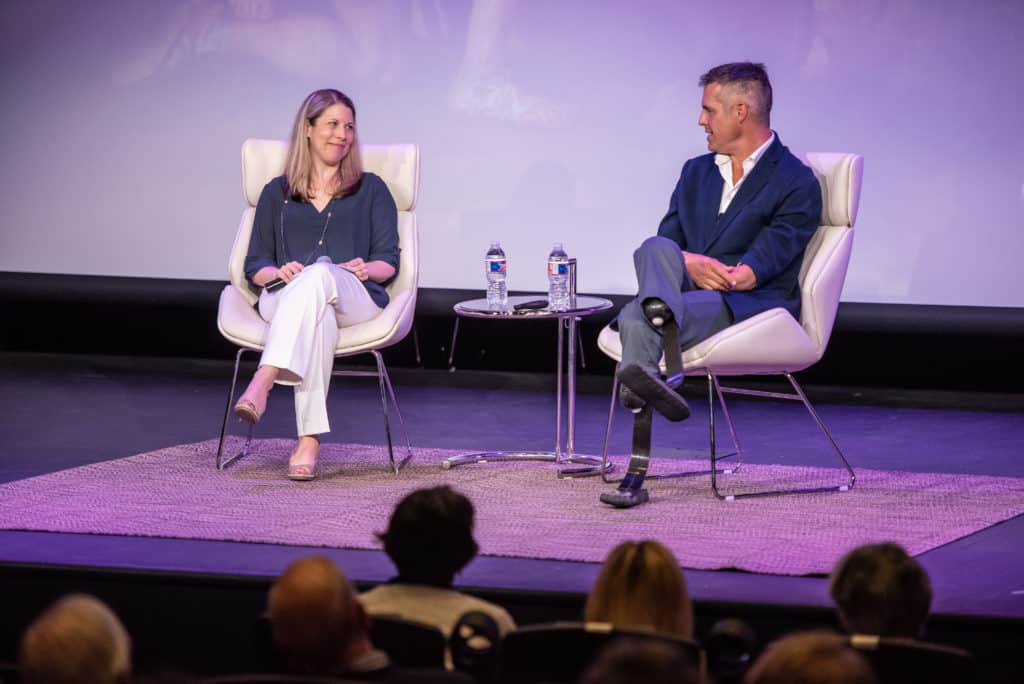As he addresses audiences across the country, end-of-life expert BJ Miller, M.D., often asks one simple question: “Who is this room has never suffered?”
Only one person has ever raised his hand.
“After the event, that gentleman came up to me and profusely apologized, saying he was always given everything he needed and never felt as if he truly suffered. He was so embarrassed that I told him it was obvious he was suffering at that very moment,” Miller said, receiving laughs from the crowd gathered to hear him April 17 at the Ron Robinson Theater in downtown Little Rock.
The event, titled “Not Whether, But How: An Evening with BJ Miller,” was part of a series presented by the UAMS Division of Palliative Medicine and the Dorothy Snider Foundation in honor of National Healthcare Decision Day.
“For the first time, we hosted this series of events to stimulate conversation in our community around the vitally important topics of living, dying and advance care planning,” said Sarah E. Harrington, M.D., director the Division of Palliative Medicine in the UAMS College of Medicine.

Sarah E. Harrington, M.D., director of the UAMS Division of Palliative Medicine, joins guest speaker BJ Miller on stage to take questions from the audience.
Palliative medicine focuses on improving the overall quality of life for patients and families at any stage of illness, including at the end of life. It can include areas such as pain and symptom management; spiritual and emotional support; and coordination of care.
In addition to Miller’s evening presentation and a lecture at UAMS, the series included two “lunch and learn” events for clergy and community members on the importance of advance care planning and an evening deemed “Let’s Have Dinner and Talk About Death,” hosted at Trio’s restaurant.
Advance care planning involves the process of making decisions about the health care you want to receive if you ever are unable to speak for yourself. It can include conversations with family members and health care providers, as well as completing official documents known as advance care directives that can include naming a health care power of attorney or creating a living will.
“While these decisions are deeply personal and may be difficult for many people, it is vitally important that everyone think about their own end-of-life choices and make those known to their loved ones while they are able to do so,” Harrington said.
Miller, who treats patients with terminal or life-altering illnesses at the University of California San Francisco Medical Center, emphasized the need for all health care providers to understand the importance of quality of life, in addition to the value of offering life-extending health care.
“We are good at the sprint of acute medicine, but we need to work on the marathon of chronic care,” he said, indicating that most health care is focused on treating immediate needs, but fails to follow through on long-term concerns, such as pain management, mental health issues and other symptoms that cause continuing distress in many patients.

Members of the UAMS Palliative Care Team discuss advance care planning during a “lunch and learn” event for the community.
No stranger to the health care system, Miller draws inspiration from his experience not only as a hospice and palliative care physician, but also as patient and person with disabilities.
Miller’s life was reshaped at age 19 by an accident that involved the live wires of a parked commuter train and resulted in the amputation of both legs below the knee and one arm below the elbow.
With that experience, Miller says he began his “formal relationship with death.” He now encourages people to reorient their relationship to the inevitable and works to bring creative power and meaning to death.
“We’re not going to invent our way out of death or suffering. That’s why we need to have these conversations,” he said, adding that quality of life should not be considered a consolation prize for those whose disease cannot be cured.
“Maintaining your quality of life is actually the grand prize. I’m all for curing when that is possible, but when it is not possible, healing should be our goal. Healing is always accessible, and it happens when there is an open exchange between doctors and patients,” he said.
In addition to Miller’s presentation, the evening included a screening of the Oscar-nominated short film “End Game,” which features Miller and documents the final weeks of terminally ill patients, their families and their health care providers.
Funding for the event series was provided by the Dorothy Snider Foundation. Additional community partners included Arkansas Hospice/Palliative Care; Wells Fargo Advisors; Hospice and Palliative Care Association of Arkansas; and Janet Pulliam, P.A.
